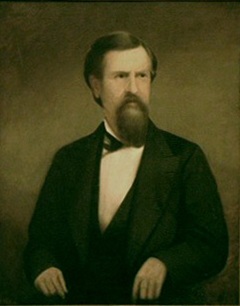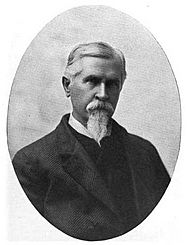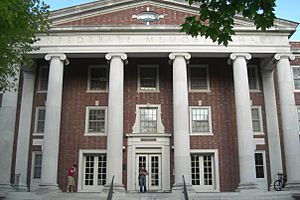James D. Porter facts for kids
Quick facts for kids
James Davis Porter
|
|
|---|---|

Portrait of Porter by Washington B. Cooper
|
|
| 20th Governor of Tennessee | |
| In office January 18, 1875 – February 16, 1879 |
|
| Preceded by | John C. Brown |
| Succeeded by | Albert S. Marks |
| United States Assistant Secretary of State | |
| In office March 20, 1885 – September 17, 1887 |
|
| President | Grover Cleveland |
| Preceded by | John Davis |
| Succeeded by | George L. Rives |
| United States Minister to Chile | |
| In office July 4, 1893 – March 14, 1894 |
|
| President | Grover Cleveland |
| Preceded by | Patrick Egan |
| Succeeded by | Edward H. Strobel |
| Member of the Tennessee House of Representatives | |
| In office 1859–1861 |
|
| Personal details | |
| Born | December 7, 1828 Paris, Tennessee |
| Died | May 18, 1912 (aged 83) Paris, Tennessee |
| Resting place | Paris City Cemetery |
| Political party | Whig Democratic |
| Spouse | Susannah Dunlap (m. 1851) |
| Profession | Attorney, educator |
| Signature | |
| Military service | |
| Allegiance | |
| Branch/service | |
| Years of service | 1861–1865 |
| Rank | |
| Battles/wars | American Civil War • Belmont (1861) • Shiloh (1862) • Chickamauga (1863) • Missionary Ridge (1863) • Atlanta Campaign (1864) • Nashville (1864) |
James Davis Porter (born December 7, 1828 – died May 18, 1912) was an important American figure. He was a lawyer, a politician, and an educator. He also served as an officer in the Confederate Army during the Civil War.
Porter was the 20th Governor of Tennessee, serving from 1875 to 1879. Later, he worked for the U.S. government. He was an Assistant Secretary of State and then a Minister to Chile (like an ambassador). Both of these jobs were during President Grover Cleveland's time in office.
Before the Civil War, Porter was a state lawmaker. He helped pass rules that made Tennessee join the Confederacy if war started. During the war, he was a key helper to Confederate General Benjamin F. Cheatham. He fought in many battles in Tennessee and Georgia.
After his political career, Porter became the leader of the University of Nashville, where he had studied. He also led Peabody College. He helped move the University of Nashville's money and property to a special fund. This allowed Peabody College to reopen near Vanderbilt University in 1909.
Contents
Early Life and Education
James Davis Porter was born in Paris, Tennessee. His parents were Dr. Thomas Kennedy Porter and Geraldine (Horton) Porter. Paris was the main town in Henry County, located in West Tennessee.
Porter went to college at the University of Nashville. He earned his first degree in 1846 and a master's degree in 1849. He then studied law in Paris with a local lawyer named John H. Dunlap. In 1851, he became a lawyer. That same year, he married Susannah Dunlap, who was his mentor's daughter.
Starting a Career and the Civil War
Porter began his law practice in Paris. He also became interested in politics. In 1859, he was elected to the Tennessee House of Representatives as a member of the Whig Party.
In 1861, Porter introduced the "Porter resolutions." These rules said that if war broke out between the states that had left the Union and the Union itself, Tennessee would join the states that had left. After the Battle of Fort Sumter in May 1861, these rules were put into action. Tennessee then signed an agreement to join the Confederacy.
Porter joined the Confederate Army as an adjutant general. He helped organize Tennessee's army. Later, he worked for General Benjamin F. Cheatham. As Cheatham's chief of staff, Porter was involved in several major battles. These included Belmont, Shiloh, Chickamauga, Missionary Ridge, and the Siege of Atlanta.
After the war ended, Porter went back to being a lawyer in Paris. In 1870, he helped write the current Tennessee State Constitution. He was also chosen to be a judge in the state's 12th circuit. After the Civil War, he switched from the Whig Party to the Democratic Party. This was the party most white Southerners supported.
Serving as Governor of Tennessee
In 1874, the Democratic Party chose Porter to run for governor. He easily won against his Republican opponent, Horace Maynard. Porter was reelected in 1876 by a large margin.
When Porter was governor, Tennessee had a lot of debt. The state had borrowed money and was struggling to pay it back. Porter believed the state should try to pay back all its debts to protect its good name. However, a tough economic time called the Panic of 1873 had reduced the state's tax money. This made it very hard to pay everything back.
Porter was a strong supporter of public education. When the Peabody Fund decided to open a school for teachers in Nashville, Porter helped make sure it was connected to the University of Nashville.
During his time as governor, the first medical school for African Americans in the South was founded in Nashville. It was called Meharry Medical College and was part of Central Tennessee College. This college was started by a church group from the North.
Porter also signed a law called the "Four Mile Law." This law was an early form of Prohibition. It said that alcoholic drinks could not be sold within four miles (6.4 km) of any school. Because schools were built in almost every community, this law made it illegal to sell alcohol in most parts of the state.
Life After Being Governor
After being governor, Porter stayed active in the economy of the "New South." This was a time when Southern leaders wanted to modernize the region with industries and businesses.
From 1880 to 1884, he was the president of the Nashville, Chattanooga and St. Louis Railway. He also served on the board of directors for the Tennessee Coal, Iron and Railroad Company.
In 1885, President Grover Cleveland appointed Porter as Assistant Secretary of State. He worked under Secretary of State Thomas F. Bayard. In 1893, during Cleveland's second term, Porter became the U.S. Minister to Chile. He served there until 1894.
Porter spent the last part of his life helping his old college, the University of Nashville, and its connected school, Peabody College. He worked to raise money for them. In 1901, he became the leader of the University of Nashville. In 1902, he became president of Peabody College. He supported building the Confederate Memorial Hall.
Later, he helped move the University of Nashville's money and property to the Peabody fund. This was so Peabody College could be reorganized and reopened. However, the fund decided to put the new college at Vanderbilt University's campus. This made Porter unhappy, and he left the fund's board in 1909.
In 1899, Porter wrote a book called The Military History of Tennessee, War of 1861-65. He was also active in the Tennessee Historical Society, even serving as its president.
James Davis Porter passed away in 1912. He is buried in the Paris City Cemetery.
Family Life
In 1851, James Porter married Susannah Dunlap in Paris, Tennessee. She was the daughter of John H. Dunlap, who had been his law teacher. They had six children together, but sadly, three of them died when they were young.
 | Laphonza Butler |
 | Daisy Bates |
 | Elizabeth Piper Ensley |



